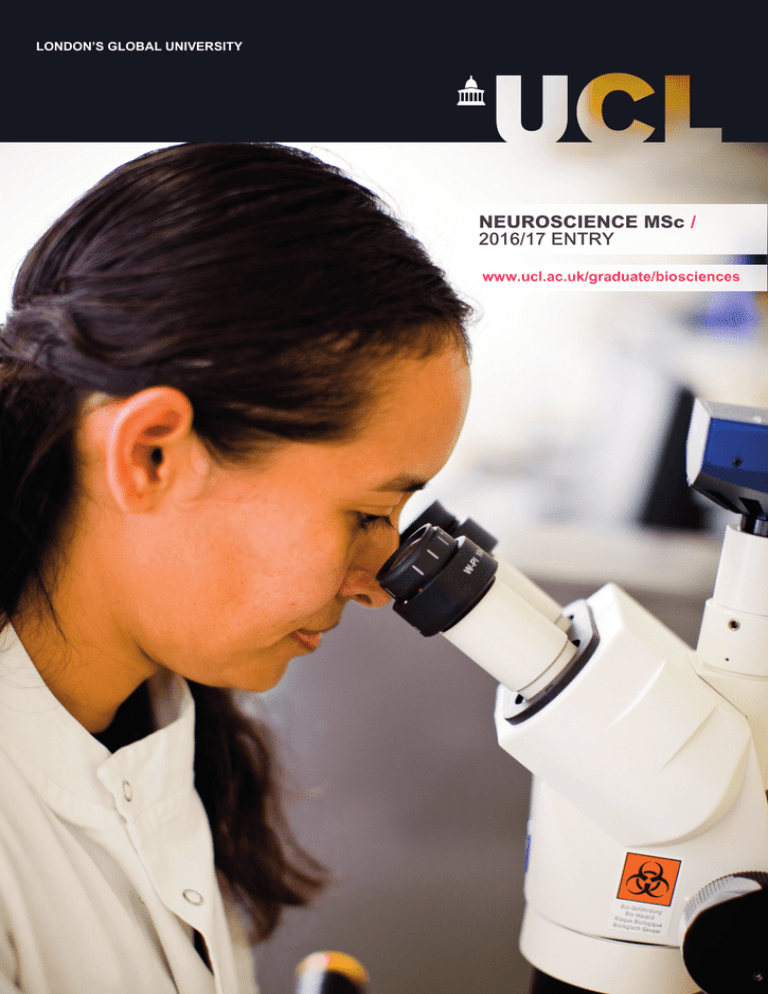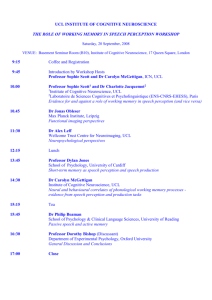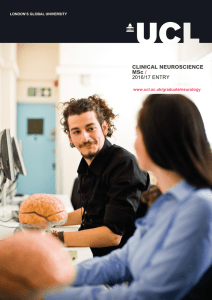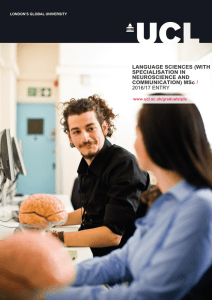NEUROSCIENCE MSc / 2016/17 ENTRY www.ucl.ac.uk/graduate/biosciences
advertisement

LONDON’S GLOBAL UNIVERSITY NEUROSCIENCE MSc / 2016/17 ENTRY www.ucl.ac.uk/graduate/biosciences Neuroscience MSc / Our brain and its workings define who we are. Neuroscience is discovering how the nervous system functions in health and disease from the molecular to the behavioural level. It is a vibrant area of science with regular exciting new breakthroughs, but there is still much to be discovered. UCL is the leading neuroscience institution in Europe, and students benefit greatly from a vast repertoire of expertise. Degree summary In addition to providing experience and participation in cutting-edge neuroscience, delivered by internationally recognised researchers, the programme generates several transferable skills, notably advanced laboratory research methods, data analysis, computer literacy, oral presentation, critical appraisal of specialised literature, and time management. // The UCL Division of Biosciences is one of the largest and most active research environments for basic biological research in the UK, and UCL has one of the largest, most dynamic and exceptional neuroscience communities in the world. // UCL has over 450 principal investigators covering all aspects of neuroscience. // This MSc provides students with a broad knowledge of neuroscience, together with deep knowledge and hands-on experience in the area of their research project. The programme is delivered through a combination of lectures, seminars, tutorials and a laboratory project. Student performance is evaluated through formal examination, coursework, and the research project. Degree structure Mode: Full-time: 1 year; Part-time: 2 years Students undertake modules to the value of 180 credits. The programme consists of four core modules (75 credits), one optional modules (15 credits) and a research project (90 credits). CORE MODULES // Developmental Neurobiology // Receptors and Synaptic Signalling // Systems and Circuits Neuroscience // Neuroscience Journal Club OPTIONAL MODULES // Neurobiology of Degeneration and Repair // Cognitive Systems Neuroscience RESEARCH PROJECT // Students undertake an original research project which culminates in a 7,000-word dissertation. Your career The majority (more than 80%) of our graduates take up PhD positions in neuroscience research, including some who stay on at UCL. Recent career destinations* include: // // // // // UCL, PhD student University of Cambridge, PhD student University of Bristol, PhD student Imperial College London, Research Assistant The Royal Society, Scheme Manager Employability The MSc Neuroscience provides a gateway into a career in neuroscience. Around 80% of our students progress to a PhD and them on into careers in academia, industry and other allied biomedical professions. The remainder go into careers such as: healthcare, education and commercial scientific research. * data taken from the ‘Destinations of Leavers from Higher Education’ survey undertaken by HESA looking at the destinations of UK and EU students in the 2010–2012 graduating cohorts six months after graduation and, where necessary, departmental records. Entry requirements A minimum of an upper second-class UK Bachelor's degree in biomedical sciences, life sciences or related subject area, or a medical degree (MBBS), or an overseas qualification of an equivalent standard. Applicants with an appropriate professional qualification and relevant work experience may also apply. English language proficiency level If your education has not been conducted in the English language, you will be expected to demonstrate evidence of an adequate level of English proficiency. The level of English language proficiency for this programme is: Good. Information about the evidence required, acceptable qualifications and test providers is provided at: www.ucl.ac.uk/graduate/english-requirements Your application The deadline for all applicants is 29 July 2016. Students are advised to apply as early as possible due to competition for places. Those applying for scholarship funding (particularly overseas applicants) should take note of application deadlines. When we assess your application we would like to learn: // // what particularly attracts you to study this programme at UCL // where you would like to go professionally with your degree how your academic, personal and professional background meets the demands of this rigorous programme Together with essential academic requirements, the personal statement is your opportunity to illustrate whether your reasons for applying to this programme match what the programme will deliver. Details on how to apply are available on the website at: www.ucl.ac.uk/graduate/apply PDF Updated: May 25, 2016 Information correct at time of going to press. See website (www.ucl.ac.uk/biosciences/) for latest information FEES AND FUNDING // UK & EU (2016/17) entry: £13,370 (FT) // Overseas (2016/17) entry: £25,140 (FT) // UK & EU (2016/17) entry: £6,845 (PT) // Overseas (2016/17) entry: £12,570 (PT) Full details of funding opportunities can be found on the UCL Scholarships website: www.ucl.ac.uk/scholarships APPLICATION DATE All applicants: 29 July 2016 CONTACT Miss Jenni Todd Email: j.todd@ucl.ac.uk Telephone: +44 (0)20 3108 4057




